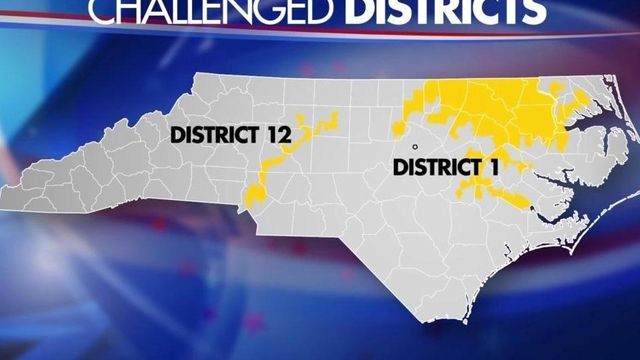Supreme Court rules NC congressional districts gerrymandered
The U.S. Supreme Court on Monday upheld a lower-court ruling that North Carolina lawmakers relied too much on race when redrawing two congressional districts after the 2010 census.
Posted — Updated"...we uphold the District Court’s conclusions that racial considerations predominated in designing both District 1 and District 12," Justice Elena Kagan wrote for the court. "For District 12, that is all we must do, because North Carolina has made no attempt to justify race-based districting there. For District 1, we further uphold the District Court’s decision that [Section 2 of the Voting Rights Act of 1965] gave North Carolina no good reason to reshuffle voters because of their race."
Gov. Roy Cooper applauded the decision.
"North Carolina voters deserve a level playing field and fair elections, and I’m glad the Supreme Court agrees," Cooper said in a statement. "The North Carolina Republican legislature tried to rig Congressional elections by drawing unconstitutional districts that discriminated against African-Americans, and that's wrong."
The ruling was unanimous regarding the 1st District, while Chief Justice John Roberts, Justice Samuel Alito and Justice Anthony Kennedy disagreed that the 12th District was racially gerrymandered.
Carolina’s 12th Congressional District: The Court junks a rule adopted in a prior, remarkably similar challenge to this very same congressional district," Alito wrote in the dissent.
The three justices argued that previous court rulings have required those challenging the legality of voting districts offer an alternative map, but the majority deemed the lack of an alternative in this case inconsequential.
"The alternative-map requirement deserves better. It is a logical response to the difficult problem of distinguishing between racial and political motivations when race and political party preference closely correlate," Alito wrote, noting there was "strong evidence" that the map was drawn to "maximize Republican opportunities."
Republican lawmakers have argued that the voting districts were drawn to maintain a GOP advantage among North Carolina's U.S. House districts.
The three-judge panel last year called that argument "more of an afterthought than a clear objective," and the Supreme Court majority upheld that stance for both districts.
"Uncontested evidence in the record shows that the State’s mapmakers, in considering District 1, purposefully established a racial target: African-Americans should make up no less than a majority of the voting-age population," Kagan wrote.
Democratic 1st District Congressman G.K. Butterfield called his far-flung district "an extreme racial gerrymander" that needed to be redrawn.
"We have legislators who are choosing their districts, not the other way around. The voters should choose their legislators," Butterfield said.
With regard to the 12th District, Kagan cited testimony from the lower-court case that only 16 percent of white voters from the six counties crossed by the district wound up in the district compared with 64 percent of black voters in those counties. Among Democrats, 18 percent of whites and 65 percent of blacks were included in the 12th District.
"The upshot was that, regardless of party, a black voter was three to four times more likely than a white voter to cast his ballot within District 12's borders," she wrote.
North Carolina Republican leaders bemoaned what they called continually changing rules on redistricting.
"We have the utmost respect for the Supreme Court, but it is challenging for our lawmakers to draw congressional districts that the courts will accept when the courts regularly change the rules state legislatures must follow when drawing them," Amy Auth, a spokeswoman for Senate President Pro Tem Phil Berger, said in a statement.
"Our position continues to be the same as the Obama Justice Department on this issue, which pre-cleared these districts as fair and legal. I don't know how any legislature can perform this task when the rules change constantly from case to case, often after the fact," state GOP Chairman Robin Hayes said in a statement. "The courts have put legislatures in an impossible situation, with their constantly changing standards. It is also important to note that this ruling does not impact our current congressional map, which we also believe is fair and legal."
"The law is now settled that states cannot use race as a predominant factor in drawing congressional districts or legislative districts. What remains unsettled, however, is to what extent the majority in the legislature can go to protect their partisan advantage," Butterfield said. "The court must rein in the Republicans or any political party that's in the majority."
Bob Phillips, executive director of North Carolina Common Cause, a good-government group that has sued over the new congressional map, said he hopes the Supreme Court decision renews the push for taking redistricting out of lawmakers' hands and putting it under the control of a nonpartisan panel.
"We're the poster child, obviously, of litigation on redistricting," Phillips said. "You can draw maps that are fair by taking the politics out of it ... and come away with a better outcome."
The state legislative districts drawn after the 2010 census have been challenged on similar grounds to the congressional districts and were also thrown out last year by federal judges. The Supreme Court hasn't yet decided whether to hear that case.
"We already have new Congressional Districts in North Carolina. What I find most significant is that the Legislature made the same legal mistake and used race the same way in drawing the state’s House and Senate districts. This opinion, with Justice (Clarence) Thomas joining the majority, must mean those districts are also unconstitutional," Anita Earls, executive director of the Southern Coalition for Social Justice, which has sued over the legislative districts, said in a statement.
Related Topics
• Credits
Copyright 2024 by Capitol Broadcasting Company. All rights reserved. This material may not be published, broadcast, rewritten or redistributed.






